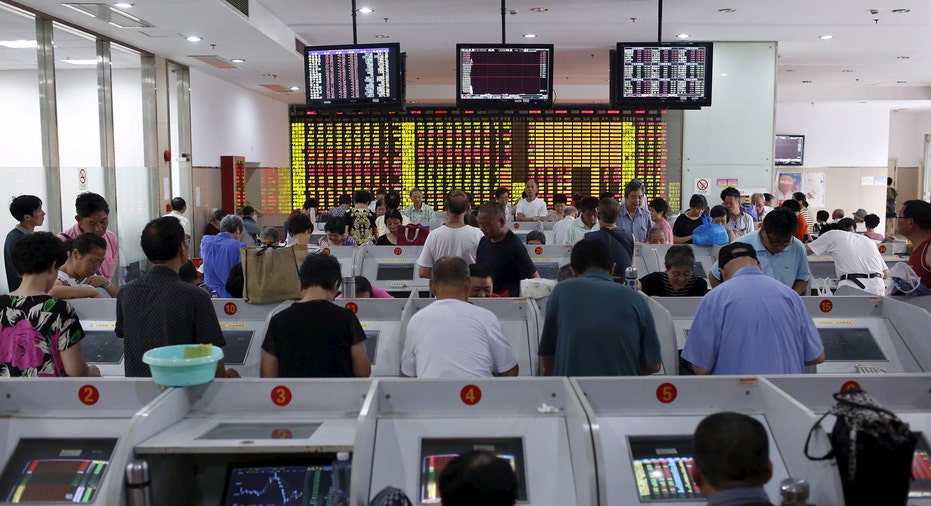China Shares End Modestly Higher as Oil Holds Gains

Chinese shares began the week on a firmer note on Monday, extending gains from Friday after a rally in battered oil prices sparked a rise in global equities.
The benchmark Shanghai Composite Index closed up 0.8 percent, while the CSI300 index of the largest listed companies in Shanghai and Shenzhen added 0.5 percent, building on gains of more than 1 percent on Friday as oil bounced off 12-year lows.
After surging 10 percent on Friday and helping Wall Street rise over 2 percent, oil held gains in Asia on Monday.
China's fickle stock markets have slumped 16-17 percent so far this year on concerns about the slowing economy and confusion over the central bank's foreign exchange policy, with thin trading volumes reflecting a lack of investor confidence and exaggerating the volatility.
Chastened by the market's bearish reaction to an early January depreciation in the yuan, the People's Bank of China (PBOC) has kept the yuan's daily midpoint fixing little changed for the past two weeks.
Spot yuan was at 6.5794 on Monday, just a few pips away from Friday's close, while offshore it firmed to 6.6110, about 0.5 percent weaker than the onshore rate.
"As the (yuan) exchange rates calm after recent interventions, stocks are likely to stabilize, and can even stage a technical reprieve in the near term," Hao Hong, managing director of research at BOCOM International said in a report.
"Recovering oil prices amid the epic (U.S.) snow storm will also help, and non-commercial traders have already cut their bets," he said, warning that the weaker overall trend had not yet ended.
STORMING IPO
China's first initial public offering under new rules to make listing easier got off to a storming start on Monday, with investors applying for more than 4,000 times the number of shares on offer. That enthusiasm is likely to remain confined to IPOs, however, which in China have typically been one-way winning bets.
Many investors have lost the stomach for the market after a wild ride since last summer, when stocks crashed 40 percent. Beijing intervened to stop that crash and orchestrate a recovery of sorts, but anyone who mistook that for a bottom and bought in will have lost their shirt again in January.
John Gan, an office clerk who said almost half of his investment had evaporated since August, is among those giving the bourses a wide berth now.
"We're already in a bear market. Two steps forward is followed by three steps backward. Any rebound would be used by investors as a chance to cut their equity exposure," he said.
Investors remain wary about further weakness in the yuan, too, despite assurances from Beijing that it has no intention of pushing it lower to gain a competitive advantage.
The central bank has jolted global financial markets twice in six months by allowing sharp, sudden slides in the currency, only to step in aggressively to stabilize it.
That intervention has, for now, chased away most of the speculators.
"Short selling of the yuan has almost disappeared so trading was relatively thin," said a dealer at a foreign bank in Shanghai.
Financial markets need "clarity and certainty" about how Chinese authorities are managing their currency, Christine Lagarde, the managing director of the International Monetary Fund, said on Saturday.
The decline in China's yuan and stock markets on concerns about the country's slowing growth have fueled a flight of capital out of the world's second-largest economy which policymakers are struggling to contain.
There were more signs of weakness in China's economy on Monday, as Japan reported that exports to China, its biggest trading partner, were down for a fifth straight month.
Other stock markets in Asia also rose on Monday, with Japan's Nikkei nudging 0.9 percent higher and MSCI's broadest index of Asia-Pacific shares outside Japan up 1.5 percent, helped by expectations that global central banks, including the People's Bank of China, will ease monetary policy further if needed.
All eyes will be on a U.S. Federal Reserve meeting this week to see whether it acknowledges concerns over the faltering Chinese outlook and global market turmoil that might add to uncertainty over its expected interest rate increases this year.
(Writing by Lincoln Feast and Will Waterman; Editing by Kim Coghill)



















